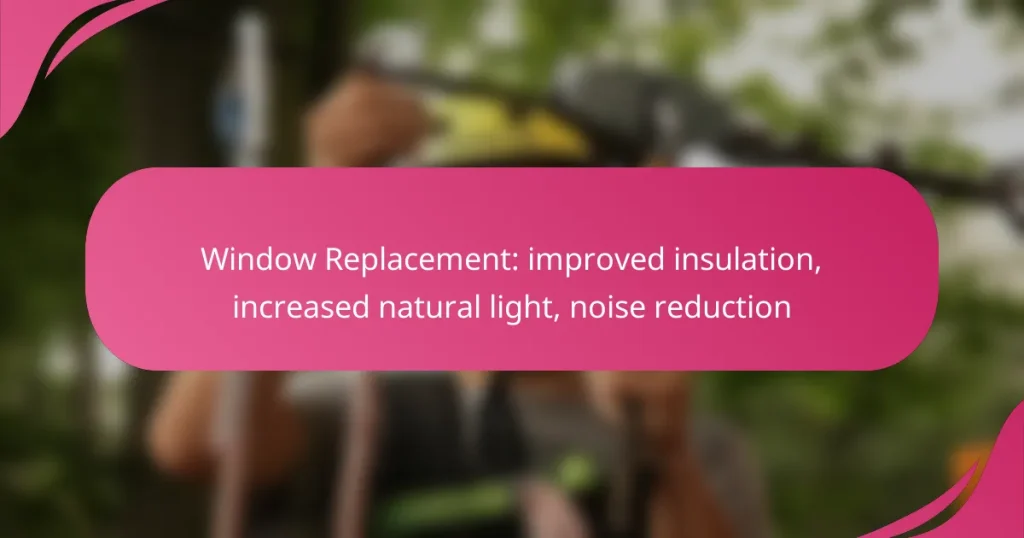Replacing windows in your home can lead to significant improvements in insulation, ensuring a more energy-efficient environment that maintains comfortable temperatures year-round. Additionally, new windows allow for increased natural light, enhancing the ambiance of your living spaces while promoting health and productivity. Furthermore, modern window designs effectively reduce noise pollution, creating a quieter and more serene atmosphere in your home.

How does window replacement improve insulation in Canadian homes?
Window replacement significantly enhances insulation in Canadian homes by utilizing advanced materials and technologies that reduce heat loss. New windows can create a more energy-efficient environment, helping to maintain comfortable indoor temperatures throughout the year.
Energy-efficient window options
Energy-efficient windows are designed to minimize heat transfer, which is crucial in Canada’s cold climate. Options include double or triple glazing, low-emissivity (Low-E) coatings, and gas fills like argon or krypton between panes. These features work together to improve thermal performance and reduce energy consumption.
When selecting windows, look for those with a high Energy Star rating, which indicates better insulation properties. This can lead to long-term savings on energy bills and a more comfortable living space.
Impact on heating costs
Replacing old windows with energy-efficient models can significantly lower heating costs in Canadian homes. Homeowners often see reductions in energy bills by 10-25% after installing new windows, depending on the existing window condition and the efficiency of the new units.
In addition to direct savings, improved insulation from new windows can enhance the overall value of a home, making it a worthwhile investment for many homeowners.
Types of insulation materials
Common insulation materials used in window replacement include fiberglass, foam, and cellulose. Each material has unique properties that affect thermal resistance and soundproofing capabilities. Fiberglass is often used for its affordability and effectiveness, while foam provides superior insulation and air sealing.
When choosing insulation, consider factors like R-value, which measures thermal resistance, and the specific climate conditions in your area. In colder regions, higher R-values are recommended for optimal performance.
Installation techniques
Proper installation techniques are crucial for maximizing the insulation benefits of new windows. This includes ensuring a tight fit, using high-quality caulking, and applying weatherstripping to prevent air leaks. A professional installation can help avoid common pitfalls that lead to reduced energy efficiency.
Homeowners should also consider the importance of flashing to direct water away from the window frame, preventing moisture damage and maintaining insulation integrity over time. Regular maintenance checks can further enhance the lifespan and performance of newly installed windows.

What are the benefits of increased natural light from new windows?
Increased natural light from new windows enhances living spaces by improving visibility and creating a more inviting atmosphere. This influx of sunlight can lead to various benefits, including health improvements, better mood, and increased productivity.
Health benefits of natural light
Natural light is essential for maintaining a healthy lifestyle. Exposure to sunlight helps the body produce vitamin D, which is crucial for bone health and immune function. Additionally, natural light can help regulate sleep patterns by influencing the body’s circadian rhythm.
Incorporating more natural light into your home can also reduce the risk of seasonal affective disorder (SAD), a type of depression that occurs during the darker months. By replacing old windows with larger or more strategically placed ones, you can significantly enhance the amount of sunlight entering your space.
Impact on mood and productivity
Natural light has a profound effect on mood and overall well-being. Studies show that environments filled with sunlight can lead to higher levels of serotonin, a hormone that boosts mood and promotes feelings of happiness. This can create a more positive atmosphere in homes and workplaces alike.
In terms of productivity, employees working in well-lit environments tend to perform better and experience fewer eye strain issues. For home offices, maximizing natural light can lead to improved focus and efficiency, making it a worthwhile consideration when replacing windows.
Window styles that maximize light
When selecting windows to maximize natural light, consider styles such as picture windows, which offer expansive views and unobstructed light. Bay and bow windows also provide additional space and light, making them ideal for living areas.
Another option is sliding glass doors, which can replace traditional doors to create a seamless transition between indoor and outdoor spaces while allowing ample sunlight. Additionally, consider window placement and orientation; south-facing windows typically receive the most sunlight throughout the day, making them a strategic choice for maximizing light in your home.

How does window replacement reduce noise pollution?
Window replacement can significantly reduce noise pollution by utilizing advanced materials and technologies that block sound transmission. New windows are designed to create a more effective barrier against external noise, enhancing comfort in residential and commercial spaces.
Soundproof window technologies
Soundproof window technologies include various features that minimize sound transfer. These can involve thicker glass, laminated glass, and specialized frame designs that reduce vibrations. Many modern windows also incorporate air gaps or inert gas fills between panes to further dampen sound waves.
When selecting soundproof windows, look for products that meet specific sound transmission class (STC) ratings. Higher STC ratings indicate better soundproofing capabilities, with values typically ranging from 30 to 50 for effective noise reduction.
Double vs. triple glazing
Double glazing consists of two panes of glass with a space in between, while triple glazing adds a third pane for even greater insulation and noise reduction. Triple-glazed windows generally provide superior sound insulation but can be heavier and more expensive than double-glazed options.
For most residential applications, double glazing offers a good balance of cost and performance, reducing noise by approximately 30% compared to single-pane windows. Triple glazing may be more beneficial in particularly noisy environments or for homes near busy roads.
Benefits of acoustic seals
Acoustic seals are essential for enhancing the soundproofing capabilities of windows. These seals are designed to fill gaps around the window frame, preventing sound leakage and improving overall insulation. Properly installed acoustic seals can significantly enhance the effectiveness of both double and triple-glazed windows.
When replacing windows, ensure that high-quality acoustic seals are used. Look for seals made from durable materials that can withstand temperature fluctuations and maintain their integrity over time, ensuring long-lasting noise reduction benefits.

What factors should be considered when choosing replacement windows?
When selecting replacement windows, consider insulation properties, natural light enhancement, and noise reduction capabilities. These factors significantly influence energy efficiency, comfort, and overall satisfaction with your home environment.
Climate considerations in Canada
In Canada, the climate varies widely, affecting window performance. Choose windows with high insulation values to combat cold winters and ensure they can withstand heavy snowfall and ice. Look for features like triple glazing and low-E coatings to enhance thermal efficiency.
Additionally, consider the orientation of your home. South-facing windows can maximize solar gain during winter, while overhangs can reduce heat in the summer. This balance can help lower heating and cooling costs throughout the year.
Window frame materials
The choice of window frame material impacts durability, insulation, and maintenance. Common options include vinyl, wood, aluminum, and fiberglass. Vinyl frames are popular for their energy efficiency and low maintenance, while wood frames offer excellent insulation and aesthetic appeal but require more upkeep.
Aluminum frames are strong and lightweight but may not provide the best insulation. Fiberglass frames combine the benefits of both wood and vinyl, offering durability and energy efficiency. Evaluate these materials based on your climate, budget, and maintenance preferences.
Energy Star ratings
Energy Star ratings indicate a window’s energy efficiency, helping you make informed choices. Windows with this certification meet strict performance standards, which can lead to lower energy bills and increased comfort. Look for Energy Star labels that specify performance metrics suitable for your climate zone.
In Canada, Energy Star windows are categorized by climate zones, ensuring you select the right product for your region. Investing in Energy Star-rated windows can qualify you for rebates or incentives, making them a financially savvy choice in the long run.

What are the costs associated with window replacement?
The costs associated with window replacement can vary widely based on factors such as window type, materials, and installation complexity. Homeowners should expect to spend anywhere from a few hundred to several thousand dollars per window, depending on these variables.
Average pricing in Canada
In Canada, the average cost for window replacement typically ranges from CAD 300 to CAD 1,000 per window. This price can fluctuate based on the size, style, and energy efficiency of the windows chosen.
For example, standard double-hung vinyl windows may cost around CAD 400 to CAD 600, while custom or high-efficiency windows can exceed CAD 1,000 each. Installation costs may add an additional CAD 100 to CAD 300 per window, depending on the complexity of the job.
Homeowners should also consider potential rebates or incentives for energy-efficient windows, which can help offset some of the costs. It’s advisable to obtain multiple quotes from contractors to ensure competitive pricing and quality service.


